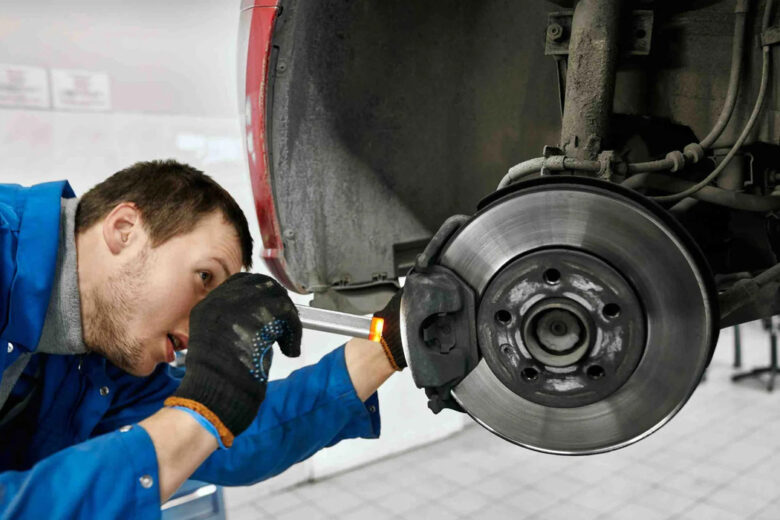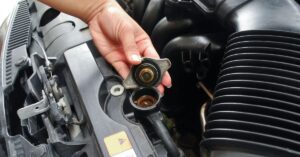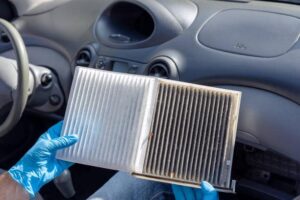One of the most important safety factors in any car is the brakes. By properly maintaining your brakes, you can keep yourself and others safe on the road. Like any other part of your car, the brakes wear out over time and require regular inspection and repair to function properly. Learn how to maintain your car’s brakes in this detailed guide. This will help you keep them in good condition.
1. Understand How Brakes Work:
To properly maintain your car’s brakes, you need to understand the different components that make up the system. Brake pads, rotors, calipers, brake lines, and brake fluid are important components. When you brake, every part is important in stopping the car. When the brake pads touch the wheels, friction is created. This will slow down your vehicle. Calipers, which press the brake pads up against the wheels, hold the brake pads in place. Brake fluid transfers the force of your foot on the brake pedal to the brake caliper. Prompt maintenance of all these parts is important to keep your braking system functioning properly.
2. Check the Brakes Regularly:
Regular inspections are important to keep your brakes in good condition. Most car experts say you should have your brakes checked at least once a year or every 12,000 miles, whichever comes first. The inspector checks the thickness of the brake pads, the condition of the brake discs, the brake lines for signs of leakage and the quantity and quality of the brake fluid. If any part looks worn or damaged, it must be repaired or replaced immediately to keep the brakes functioning properly and personnel safe.
3. Check the Thickness of the Brake Pads:
Brake pads wear out over time because they create pressure that causes the car to stop. Worn brake pads do not work properly and can cause longer stops, potentially leading to an accident. Pay attention to the thickness of your brake pads every day. Most brake pads need to be replaced if they are less than 1/4 inch thick. Some brake pads show signs of wear and squeak when they need to be replaced. If you hear this noise or notice that your stops are taking longer than normal, check your brake pads immediately.
4. Check the Fluid in the Brake:
The hydraulic fluid that makes up brake fluid is an important part of the braking process. Over time, brake fluid absorbs moisture from the air, reducing braking effectiveness and even causing brake failure. Therefore, it is important to check the brake fluid level regularly and replace it according to the manufacturer’s instructions, usually every one to two years. Only use brake fluid recommended for your vehicle. Using the wrong type can damage your system.
5. Check the Brake Disc:
These are the plates that the brake pads press against to stop the car. Over time, the rotors can become worn or bent. Otherwise, if your brake pads wear out due to worn or warped rotors, your brakes will not function properly. During your regular brake inspections, you should check the rotors for signs of damage or wear. To ensure optimal braking performance, rotors may need to be refaceted or replaced if they are severely worn or deformed.
6. Keep Brake Lines and Hoses in Good Condition:
Robust brake lines and hoses transport brake fluid from the master cylinder to the brake calipers. If there are cracks or leaks in these parts, the brakes will not work. As part of normal maintenance, you should inspect your brake lines and hoses for signs of damage or wear. If any of your lines are damaged, you should replace them immediately to keep your braking system in good condition and prevent brake fluid leakage.
7. Listen to Your Car:
Pay close attention to how your car sounds and feels and how your brakes work. If your brakes are making strange noises, such as grinding or squealing, or if the brake pedal feels soft or sticky, it could indicate a brake problem. Don’t ignore these signals. A professional should inspect your brakes so that problems can be discovered and fixed before they get worse and cost you more money.
Conclusion:
For the safety and reliability of your car, you must maintain your brakes regularly. By understanding your braking system, checking it regularly, and solving any problems immediately, you can ensure that your brakes remain in good condition. This ensures the safety of you and your guests, but also of other motorists and people walking on the road. Remember, proper brake maintenance not only extends the life of your car, but also gives you peace of mind while driving.
FAQs:
1. How often should I check my brakes?
Have your brakes inspected at least once a year or every 12,000 miles, whichever comes first. However, if you often drive in bad weather or heavy traffic, you may need more inspections.
2. How can I judge if the brakes need work?
If your brakes squeak or grind when you press the brake pedal, your car pulls to one side when you park, or the brake system warning light comes on, your brakes may need maintenance.
3. How often should brake pads be replaced?
Most brake pads need to be replaced every 30,000 miles, but this can vary greatly depending on how you drive, the type of car, and the quality of the brake pads. Be sure to check them during regular inspections and replace them with new ones if they are less than 1/4 inch thick.
4. Why do the brakes wear out so quickly?
Many things can cause brakes to wear out quickly, including aggressive driving (such as frequent stops), driving in traffic with frequent stops and starts, and driving in steep or hilly areas. Additionally, poorly made brake pads will wear out faster than well-made brake pads.
5. What’s wrong with my brakes?
There are many reasons why your brakes may squeak. Usually, this is because the brake pads are so worn that you can see signs of wear. This makes a loud noise to let you know that the brake pads need to be replaced. The brake pads and wheels can also squeak if there is dirt or other debris between them.




